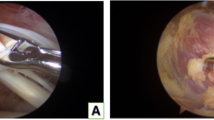Abstract
Purpose
To assess histological changes and possible differences in the quadriceps of patients undergoing open repair of the tendon after spontaneous rupture, and subjects with no history of tendon pathology.
Materials
Biopsies were harvested from the quadriceps tendon of 46 patients (34 men, 12 women) who had reported unilateral atraumatic quadriceps tendon rupture and had undergone surgical repair of the tendon. Samples were also harvested from both the tendons in 11 (N = 11 × 2) patients, nine males and two females, dying from cardiovascular disorders. For each tendon, three slides were randomly selected and examined under light microscopy, and assessed using a semiquantitative grading scale (range 0–21) which considers fibre structure, fibre arrangement, rounding of the nuclei, regional variations in cellularity, increased vascularity, decreased collagen stainability, and hyalinisation.
Results
The pathological sum-score averaged 19.2 ± 3.7 in ruptured tendons and 5.6 ± 2.0 in controls, and all variables considered were significantly different between the two groups, showing an association between tendon abnormalities and rupture (0.05 < P < 0.001).
Conclusion
This study confirms that the presence of histological degenerative changes in torn quadriceps tendons increases the risk of rupture.
Similar content being viewed by others
References
Rosenthal MA, Tiver KW (1991) Patellar metastases in the presence of chondrocalcinosis. Australas Radiol 35:197–198
Shah MK (2002) Simultaneous bilateral rupture of quadriceps tendons: analysis of risk factors and associations. South Med J 95:860–866
Preston FS, Adicoff A (1962) Hyperparathyroidism with avulsion of three major tendons. Report of a case. N Engl J Med 266:968–971
Ribbans WJ, Angus PD (1989) Simultaneous bilateral rupture of the quadriceps tendon. Br J Clin Pract 43:122–125
Cooney LM, Aversa JM, Newmann JH (1991) Insidious bilateral infrapatellar tendon rupture in a patient with systemic lupus erythematosus. Arch Orthop Trauma Surg 110:22–26
Miles JW, Grana WA, Egle D, Min KW, Chitwood J (1992) The effect of anabolic steroids on the biomechanical and histological properties of rat tendon. J Bone Joint Surg Am 74:411–422
Marie I, Delafenetre H, Massy N, Thuillez C, Noblet C (2008) Tendinous disorders attributed to statins: a study on 96 spontaneous reports in the period 1990–2005 and review of the literature. Arthritis Rheum 59:367–372
Loppini M, Maffulli N (2011) Conservative management of tendinopathy: an evidence-based approach. Muscles Ligaments Tendons J 1:133–136
Longo UG, Fazio V, Poeta ML, Rabitti C, Franceschi F, Maffulli N, Denaro V (2009) Bilateral consecutive rupture of the quadriceps tendon in a man with BstUI polymorphism of the COL5A1 gene. Knee Surg Sports Traumatol Arthrosc 19(8):1403
Giombini A, Dragoni S, Di Cesare A, Di Cesare M, Del Buono A, Maffulli N (2011) Asymptomatic Achilles, patellar, and quadriceps tendinopathy: a longitudinal clinical and ultrasonographic study in elite fencers. Scand J Med Sci Sports. doi:10.1111/j.1600-0838.2011.01400.x
Kannus P, Jozsa L (1991) Histopathological changes preceding spontaneous rupture of a tendon. A controlled study of 891 patients. J Bone Joint Surg Am 73:1507–1525
Movin T (1998) Aspects of aetiology, pathoanatomy and diagnostic methods in chronic mid-portion achillodynia. Karolinska Institute, Stockholm, Sweden, pp 1–51
Khan KM, Maffulli N (1998) Tendinopathy: an Achilles’ heel for athletes and clinicians. Clin J Sport Med 8:151–154
Cross SS (1996) Kappa statistics as indicators of quality assurance in histopathology and cytopathology. J Clin Pathol 49:597–599
Ippolito E, Postacchini F, Ricciardi-Pollini PT (1975) Biochemical variations in the matrix of human tendons in relation to age and pathological conditions. Ital J Orthop Traumatol 1:133–139
Jarvinen TA, Jarvinen TL, Kannus P, Jozsa L, Jarvinen M (2004) Collagen fibres of the spontaneously ruptured human tendons display decreased thickness and crimp angle. J Orthop Res 22:1303–1309
Trobisch PD, Bauman M, Weise K, Stuby F, Hak DJ (2010) Histologic analysis of ruptured quadriceps tendons. Knee Surg Sports Traumatol Arthrosc 18:85–88
Sutherland A, Maffulli N (1998) In process citation [Article in German]. Oper Orthop Traumatol 10:50–58
Longo UG, Franceschi F, Ruzzini L, Rabitti C, Morini S, Maffulli N, Denaro V (2008) Histopathology of the supraspinatus tendon in rotator cuff tears. Am J Sports Med 36:533–538
Longo UG, Franceschi F, Ruzzini L, Rabitti C, Morini S, Maffulli N, Denaro V (2009) Characteristics at haematoxylin and eosin staining of ruptures of the long head of the biceps tendon. Br J Sports Med 43:603–607
Jhingan S, Perry M, O'Driscoll G, Lewin C, Teatino R, Malliaras P, Maffulli N, Morrissey D (2011) Thicker Achilles tendons are a risk factor to develop Achilles tendinopathy in elite professional soccer players. Muscle Ligament Tendon J I:51–56
Maffulli N, Barrass V, Ewen SW (2000) Light microscopic histology of Achilles tendon ruptures. A comparison with unruptured tendons. Am J Sports Med 28:857–863
Nakagawa Y, Hayashi K, Yamamoto N, Nagashima K (1996) Age-related changes in biomechanical properties of the Achilles tendon in rabbits. Eur J Appl Physiol Occup Physiol 73:7–10
Strocchi R, De Pasquale V, Guizzardi S, Govoni P, Facchini A, Raspanti M, Girolami M, Giannini S (1991) Human Achilles tendon: morphological and morphometric variations as a function of age. Foot Ankle 12:100–104
Maffulli N, Ewen SW, Waterston SW, Reaper J, Barrass V (2000) Tenocytes from ruptured and tendinopathic Achilles tendons produce greater quantities of type III collagen than tenocytes from normal Achilles tendons. An in vitro model of human tendon healing. Am J Sports Med 28:499–505
Author information
Authors and Affiliations
Corresponding author
Rights and permissions
About this article
Cite this article
Maffulli, N., Del Buono, A., Spiezia, F. et al. Light microscopic histology of quadriceps tendon ruptures. International Orthopaedics (SICOT) 36, 2367–2371 (2012). https://doi.org/10.1007/s00264-012-1637-z
Received:
Accepted:
Published:
Issue Date:
DOI: https://doi.org/10.1007/s00264-012-1637-z




